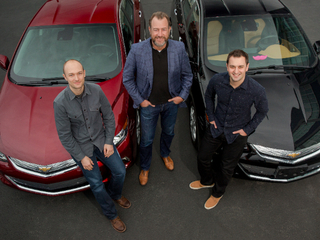Editor’s note: Our 6th Annual Vator Splash LA conference is coming up on October 13 at the Loews Hotel in Santa Monica. Speakers include Mark Cuban (one of the hosts of Shark Tank and owner of the Dallas Mavericks); Brian Lee (Founder & CEO, Honest Company); Leura Fine (Founder & CEO, Laurel & Wolf ); Nick Green (Co-Founder and Co-CEO, Thrive Market); Tri Tran (CEO & Co-founder, Munchery); Adam Goldenberg (Founder & CEO, JustFab); Andre Haddad (CEO, Turo); Mike Jones (Founder, Science) and many more. Join us! REGISTER HERE.
The self-driving cars are coming. Fast.
Evidence can be found all over the recent news stories. Last week, one amazing hacker leading Comma.ai revealed a $999 technology add-on (plus a $24 monthly subscription) that makes any vehicle autonomous. Two tech executives up in Seattle (Tom Alberg of Madrona Venture Group and Amazon and Craig Mundie, formerly of Microsoft) are proposing to reserve 150 miles of interstate between Seattle and Vancouver for self-driving cars. Michigan is proposing a bill that would legalize fully driverless cars. Uber is live testing over a dozen self-driving cars in Pittsburgh.
And while all these developments are taking place in the small shadow cast by Tesla’s fatal car crash over the summer (which occurred while in the car’s “Autopilot” mode), it’s widely believed that more autonomous vehicles would actually reduce the number of such incidents, which are often attributable to human error.
Not to have his company excluded from all the excitement, Lyft co-founder and president John Zimmer took to Medium to post a lengthy essay on The Third Transportation Revolution, which will be fueled by self-driving cars.
In the piece, Zimmer says that autonomous vehicles will account for the majority of Lyft rides within five years.


The first step toward this transition was Lyft’s partnership with General Motors, which was cemented when the ridesharing company closed its $1 billion funding round at the start of the year. In March, the two companies launched Express Drive, a car rental program for individuals that need access to cars in order to drive for Lyft.
Two months later, reports emerged that Lyft and GM were aiming to test self-driving electric cars on city streets by 2017. In his post, Zimmer says his company already has some autonomous cars in use in San Francisco and Phoenix. If true, that would put the company on equal footing as Uber, which just started testing self-driving cars with real passengers.
Notably, though both are taking part in the evolution toward a self-driving future, Zimmer takes particular aim at Tesla for what he thinks is a wrongheaded approach to bringing about that future:
“Tesla CEO Elon Musk believes the transition to autonomous vehicles will happen through a network of autonomous car owners renting their vehicles to others. Elon is right that a network of vehicles is critical, but the transition to an autonomous future will not occur primarily through individually owned cars. It will be both more practical and appealing to access autonomous vehicles when they are part of Lyft’s networked fleet.”
Of course, it’s a given that the CEO of the ridesharing company thinks fleets will help advance self-driving technology, while the CEO of the more traditional auto company believes private ownership will be the answer.
Zimmer also believes that private car ownership will largely end in major U.S. cities by 2025. And, as a result, cities will look a lot different than they do today.
“Ridesharing is just the first phase of the movement to end car ownership and reclaim our cities,” he said.
He also teased out what Lyft’s future business model could look like as self-driving cars become more commonplace. For example, while the company would retain its existing pay-per-trip model for customers that don’t drive often, Lyft will start offering subscription plans customized for different use cases. As specific examples, he says somebody who takes a drive every weekend would sign up for the “unlimited mileage plan,” while someone who just uses the service for Saturday night rides would get the “premium package with upgraded vehicles.”
Overall, it’s a fascinating vision, and incredibly interesting to get a fairly transparent view into how the top executive of one ridesharing company views our rapidly approaching autonomous future.
Ed. note: Our 6th Annual Vator Splash LA conference is coming up on October 13 at the Loews Hotel in Santa Monica. Speakers include Mark Cuban (one of the hosts of Shark Tank and owner of the Dallas Mavericks); Brian Lee (Founder & CEO, Honest Company); Leura Fine (Founder & CEO, Laurel & Wolf ); Nick Green (Co-Founder and Co-CEO, Thrive Market); Tri Tran (CEO & Co-founder, Munchery); Adam Goldenberg (Founder & CEO, JustFab); Andre Haddad (CEO, Turo); Mike Jones (Founder, Science) and many more. Join us! REGISTER HERE.



















